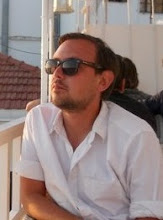
Are you happy?
That's the question at the center of Jean Rouch and Edgar Morin's cinema-verité documemtary Chronicle of a Summer and it's a tricky one. Tracked down on the street by roving female reporters with tape recorder in hand, the denizens of Paris in the summer of 1960 seem for the most part embarrassed by the question; it's too personal, as though they were asked if their sex life is good or how much money they make. The question is a simple one in the asking but perhaps an impossible one in the answering.
This is, I think, the exact effect the filmmakers — ethnographers of contemporary Europe, so to speak — are after, and, maybe more to the point, the crux of their cinematic experiment. If the point is to acknowledge the camera's presence, the filmmaker's role in sculpting the footage of any film, fiction or nonfiction, into a coherent structure, then the question (open-ended but leading, assuming an uncomfortable intimacy with the documentary subject) gets at more than just a new form of nonfiction filmmaking. It signals a moment in which cinema, particularly of the French variety, decided to turn the lens on itself.
Rouch and Morin's documentary purports to examine the interior life of the French at a historical moment as uncomfortable as the question they ask: Algeria rattles for independence; the nation attempts to reconcile the proud image of de Gaulle with the shame of Vichy collaborationism; the oldest members of the post-war generation are becoming cognizant, slowly but surely, of a world in which the ideals of the Allies are not matched by the realities of racism, sexism and economic want present in the streets of Paris.
In eight years, RFK and MLK will be dead, gunned down at the height of their fame on the American scene. Paris' students will shut down the country with a general strike, allied with the blue-collar factories workers of the dingier banlieux, Prague and Budapest will experience a springtime thaw of Communism and the quick freeze of Moscow's fierce reaction, and Mexico City's thin air will be pierced by the sounds of revolution. In short, Chronicle of a Summer takes the public as its subject, too — and sees, in the still-fresh wounds of the Holocaust, as well as the wounds of the '60s yet to be made, a moment of epochal shift.
If this sounds a bit heavy, that's because it is; Rouch and Morin are as well-versed in film theory and anthropology as they are in cutting and questioning. But the film, for all its high-mindedness, is at root a joy to watch. People, regular people willing to sit in front of a camera and reveal, however slightly, their inner machinations, are inherently interesting. Rouch and Morin film as though they were semi-psychologists, poking and prodding — provoking, you might say — the heart of the matter.
An Italian transplant, with pouting lips and heavy eyes, breaks down over the missed connections that leave her unmoored.
An African student examines, unknowingly, the numbers tattooed on the forearm of a concentration camp survivor.
A worker at the Renault factory, living a monotonous life between the workplace and his tiny, sparsely furnished room, strains against the constrictions life has placed on him.
A portrait of the nation as a stumbling man, you might call it, populated not by patriotic Gaullists ready to die for liberté, fraternité, egalité, but by people with few ties to the French idea as it is, and many ties to the human idea as they wish it to be. That is, I think, why Rouch and Morin's cinema-verité works so well: the style is cinematically more honest than the so-called "direct cinema" of a film like Primary because it admits, as the New Journalists would later do by imposing the "I" on nonfiction writing, that perfect objectivity can never exist, has never existed.
But it's more than that. What the filmmakers are getting at by attempting to provoke this "cinema-truth" is the way in which, in Paris in the summer of 1960, the old rules no longer apply. The idealism of the Resistance may survive in the speeches of the world's leaders, but it has disappeared, or never appeared in the first place, in the minds of the dispossessed, the unhappy, the unmoored.
History has a way of throwing curveballs that necessitate some recalibration in the arts. The modernists responded to the terrors of World War I with stream-of-consciousness and the fragmentation of narrative; the theater of cruelty imagined a nasty, brutish world not far from the horrors of the Depression and the war.
Cinema-verité forms a response to another curveball while it's still flying through the air — inexact, mobile, impossible to pin down. More than anything else, Chronicle of a Summer takes its title with a grain of salt, with tongue in cheek: it suggests that "a detailed narrative record or report," as American Heritage defines "chronicle," is more about detail than narrative, that in a hopelessly fractured world — a world with many questions but few answers — we just have to sew the pieces together and work from there.

No comments:
Post a Comment